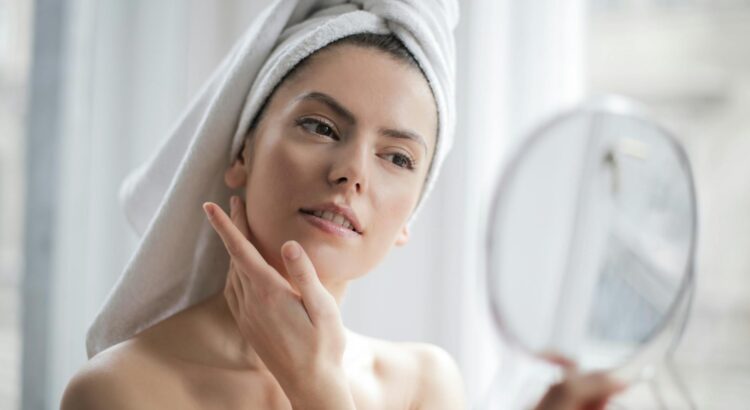Skin is the largest organ in the body, covering and protecting us from external factors. Its role goes beyond aesthetics; skin is vital for overall health. Taking care of your skin can help you prevent skin issues, such as acne, wrinkles, and more serious conditions like skin cancer. Proper skincare is not only about looking good; it’s about maintaining healthy, functioning skin.
In this comprehensive guide, we’ll discuss the five major skin types, how to properly care for your skin, and how to tackle acne with effective treatments. Whether you have oily, dry, sensitive, or combination skin, this article will provide you with everything you need to know.
Why Skin Care is Essential
Your skin serves as a barrier against infections, harmful bacteria, and UV radiation. By keeping your skin clean and healthy, you help it perform its duties effectively, allowing it to continue protecting your body. Healthy skin is also a sign of overall wellness, and maintaining it now will prevent aging signs and other skin problems in the future.
Skincare involves much more than washing your face. A proper routine includes cleansing, moisturizing, exfoliating, and applying treatments if needed. Each step helps ensure that your skin stays clean, hydrated, and resilient.
Different Skin Types: Understanding Your Skin
Understanding your skin type is key to selecting the right products and treatments. The five main skin types are normal, dry, oily, combination, and sensitive skin. Each has different needs, so it’s important to know your skin type before choosing a skincare routine.
Normal Skin
Normal skin is considered the ideal skin type. It is not too oily or dry and typically has few blemishes. People with normal skin enjoy smooth, firm skin with small pores and a generally even tone. This type of skin has good moisture retention, and the skin feels soft to the touch. With age, normal skin may show slight signs of aging like fine lines but remains relatively free from common skin issues.
Dry Skin
Dry skin often feels tight, especially after washing, and can become flaky and irritated. This skin type lacks the natural oils that help keep skin moisturized. Dry skin may be more prone to wrinkles and fine lines, especially as it ages. Common signs of dry skin include redness, rough texture, and cracked skin.
Dry skin can be aggravated by environmental factors, such as cold weather, air conditioning, and harsh skincare products. Using gentle, moisturizing skincare products is crucial for this skin type.
Oily Skin
Oily skin produces excess sebum, leading to a shiny complexion and larger pores. People with oily skin often experience acne breakouts, blackheads, and whiteheads. While oily skin may appear youthful for longer, it can lead to clogged pores and skin irritation if not properly managed.
Oily skin requires cleansing products that can control excess oil without drying out the skin. However, too much oil can cause skin to look greasy, so a good balance is essential for maintaining healthy skin.
Combination Skin
Combination skin features characteristics of more than one skin type. Typically, this skin type has an oily T-zone (forehead, nose, chin) and dry or normal cheeks. The T-zone may be prone to acne, while the rest of the face may feel tight or dry.
People with combination skin may need to use different products for different areas of their face. A gentle, balanced approach can help manage both oily and dry zones without irritating the skin.
Sensitive Skin
Sensitive skin is easily irritated by environmental factors, skincare products, or even temperature changes. People with sensitive skin are more likely to experience reactions such as redness, rashes, burns, or hives. This skin type requires extra care to avoid harsh chemicals or fragrances.
For sensitive skin, hypoallergenic and non-comedogenic products are the best choice. Being mindful of your skin’s sensitivities can help you avoid flare-ups and keep your skin calm and healthy.
Skin Care Tips for Every Type
Regardless of your skin type, following a few basic skin care principles can ensure your skin stays healthy and well-maintained.
1. Remove Makeup Before Washing
It’s important to remove makeup before you cleanse your face. Makeup, especially foundation and concealer, can trap dirt, oil, and bacteria in your pores. If left on your skin, it can contribute to breakouts and irritation. Use a gentle makeup remover or baby oil to wipe away makeup. This step ensures that your cleanser works more efficiently.
2. Use Lukewarm Water for Cleansing
Always cleanse your skin with lukewarm water, as hot or cold water can damage your skin. Water that is too hot can strip your skin of essential oils, while cold water may not effectively remove dirt and oils. Lukewarm water helps open your pores, allowing your cleanser to remove impurities without causing harm.
3. Choose the Right Cleanser for Your Skin Type
Using the right cleanser is crucial for maintaining healthy skin. For sensitive skin, opt for a mild, hypoallergenic cleanser. For oily skin, look for cleansers that control oil and prevent acne breakouts. People with dry skin should avoid harsh cleansers and choose moisturizing formulas.
Best Cleanser Tips:
- For dry skin: Use gentle, hydrating cleansers with ingredients like glycerin or ceramides.
- For oily skin: Choose gel-based cleansers with salicylic acid or benzoyl peroxide to fight acne.
- For sensitive skin: Opt for fragrance-free, alcohol-free cleansers with soothing ingredients like chamomile or aloe vera.
4. Exfoliate (But Be Gentle)
Exfoliation helps remove dead skin cells and promotes skin renewal. However, over-exfoliating can lead to irritation, especially if you have sensitive skin. Choose a gentle exfoliator and use it only 1-2 times per week.
For oily or acne-prone skin, exfoliating with microbeads or chemical exfoliants like alpha hydroxy acids (AHAs) or beta hydroxy acids (BHAs) can help keep pores clean and prevent breakouts.
5. Moisturize Daily
Moisturizing is essential for all skin types. Even oily skin needs moisture to stay balanced. For dry skin, use thick, rich moisturizers, while those with oily skin can choose lighter, gel-based moisturizers. Sensitive skin should opt for soothing, fragrance-free moisturizers with calming ingredients like vitamin E or aloe vera.
6. Don’t Forget the Sunscreen
Sun protection is critical for maintaining healthy skin and preventing signs of aging and skin cancer. Use a broad-spectrum sunscreen with SPF 30 or higher every day, even on cloudy days. Apply sunscreen 15 minutes before going outdoors, and reapply every two hours if you’re in direct sunlight.
7. Take Care of Sensitive Areas
The skin around your eyes is more delicate than the rest of your face and can show signs of aging earlier. Use gentle products around your eyes, and consider applying aloe vera or vitamin E oil to keep the skin moisturized and reduce the appearance of fine lines.
8. Stay Hydrated
Drinking plenty of water is essential for keeping your skin hydrated. Hydrated skin looks plump, youthful, and glowing. Aim to drink at least 8 cups of water a day to support skin hydration from the inside out.
How to Treat Acne Based on Your Skin Type
Acne is a common skin problem that affects people of all ages and skin types. Whether you have oily, dry, sensitive, or combination skin, acne treatment must be tailored to your skin’s unique needs.
Treating Oily Skin Acne
Oily skin is more prone to acne due to the excess production of sebum, which can clog pores. To manage acne on oily skin, opt for products containing salicylic acid, benzoyl peroxide, or retinoids. These ingredients help control excess oil production, reduce bacteria, and prevent clogged pores.
Treating Dry Skin Acne
Dry skin can also experience acne, particularly when skin becomes irritated by harsh treatments. Use gentle acne products designed for dry skin, and avoid over-drying your face. Look for moisturizers that contain hydrating ingredients like hyaluronic acid or glycerin to help keep your skin moist and balanced.
Treating Sensitive Skin Acne
Sensitive skin requires special care when treating acne. Choose non-irritating, hypoallergenic products with soothing ingredients. Avoid harsh acne treatments that contain alcohol or fragrances, as they can cause flare-ups. Opt for gentle formulas with ingredients like green tea extract or chamomile.
Treating Combination Skin Acne
Combination skin can present a challenge because different areas of your face require different treatments. For the oily T-zone, use acne-fighting ingredients like salicylic acid or benzoyl peroxide. For dry areas, apply hydrating creams or lotions. Choose products that balance both needs and avoid over-drying your skin.
Acne Treatments to Try:
- Salicylic acid: Helps exfoliate the skin and prevent clogged pores.
- Benzoyl peroxide: Reduces acne-causing bacteria and inflammation.
- Retinoids: Stimulate collagen production and help clear clogged pores.
- Sulfur-based products: Gentle and effective for sensitive skin.
Conclusion
Taking care of your skin is an investment in your health and appearance. By understanding your skin type and following a proper skincare routine, you can keep your skin clear, hydrated, and resilient. Whether you’re dealing with acne, dryness, or sensitive skin, the right treatments can make a big difference.
Don’t forget that skin care isn’t just about external products—drinking plenty of water, eating a balanced diet, and getting enough sleep all contribute to healthy skin. Your skin deserves the best care, so start today to ensure it stays in great condition for years to come.

Dr. Jerry K is the founder and CEO of YourWebDoc.com, part of a team of more than 30 experts. Dr. Jerry K is not a medical doctor but holds a degree of Doctor of Psychology; he specializes in family medicine and sexual health products. During the last ten years Dr. Jerry K has authored a lot of health blogs and a number of books on nutrition and sexual health.
